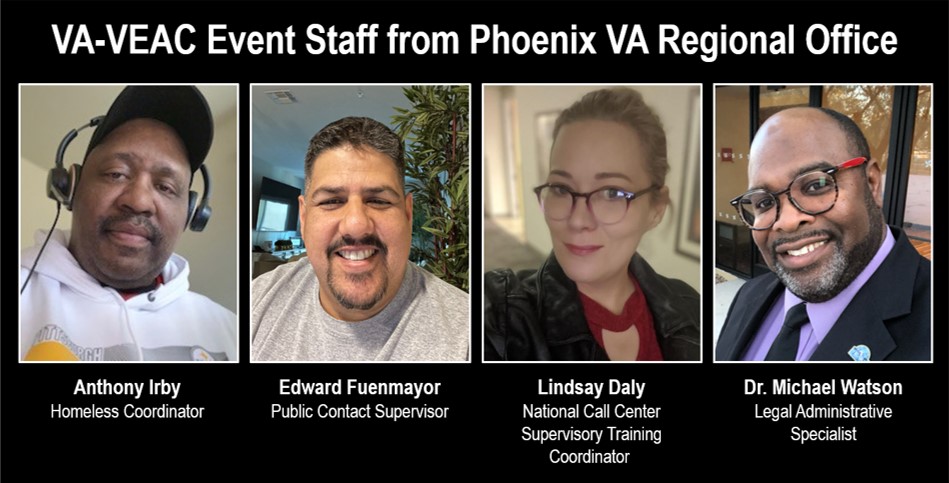The Phoenix VA regional office recently participated in a Virtual Veterans Experience Action Center (VEAC) to deliver assistance to Veterans filing for the VA benefits they have earned through their military service.
Arizona Veterans were notified of the event through targeted marketing and were able to register through the “Appointment-Plus” website. More than 630 Veterans registered for the three-day event.
More than 160 Veterans were assisted by Phoenix VA regional office staff members, including VA National Call Center supervisors and Veteran Service Center public contact representatives.
On each day of the event, VA telephoned Veterans at their specified appointment and provided assistance. At the conclusion of the call, each Veteran was routed to the central command post, known as the Veteran Engagement Team (VET), for completion of a satisfaction survey.
They were also transferred to another supporting agency or office if they had other VA questions or required further community support.
Assisted Marine Veteran struggling with homelessness
One Marine Corps Veteran who participated in the Virtual VEAC was struggling with homelessness and needed help reopening his VA disability claim.
National Call Center Supervisory Training Coordinator Lindsay Daly took his case, spoke to him at length and immediately reviewed his file. She found he was previously denied because of missing examinations.
During a follow-up conversation, Daly listened as the Veteran discussed a battle buddy who had committed suicide and the impact it had on him. He was so troubled and preoccupied that he missed his medical exam appointments. On the spot, Daly helped him fill out the needed form, line-by-line, and included his medical center records as new evidence to support his claim.
An inpatient at the Phoenix VA Healthcare System confided in Daly about his military service, mental health struggles, and worries about a place to live after hospital discharge. Daly quickly connected the Veteran with the Phoenix RO Homeless Program Coordinator and provided information about available transitional housing.
After the call, Daly reached out to the Public Contact team for assistance with placing a “Homeless Flash” on the Veteran’s record. Legal Administrative Specialist Dr. Michael Watson ensured the alert was active so the Veteran’s claim would be expedited. He also made direct contact with the Veteran, encouraging him to continue treatment and contact Phoenix VA social workers.
“I feel positive there is help for me.”
“I am so appreciative of all the assistance I received from both Ms. Daly and Mr. Watson,” said the Veteran. “I feel positive that there is help for me when I complete treatment.”
While the different VA offices and participating community partners understood that organizing and conducting a Virtual VEAC event would be challenging, the employees realized their hard work would have a significant and lasting impact on the lives of many Veterans.
“All team members contributed immensely during this three-day Virtual VEAC event,” said Public Contact Supervisor Edward Fuenmayor. “Their compassion for Veterans and dedication to the VA mission is remarkable. They set the bar high while at the same time going the extra mile to resolve challenging calls and addressing concerns for our most sensitive Veterans.”
The initiative was a collaboration between VBA Central Office’s Office of Field Operations Outreach & Stakeholder Engagement, the Veterans Experience Office, Phoenix VA regional office, Phoenix VA Health Care System, the Board of Veterans Appeals, the National Cemetery Administration, Arizona Department of Veterans’ Services, and Arizona Coalition for Military Families – Be Connected, a community partner.
Monica Cabrera is a public affairs officer at the Phoenix VA regional office.
Topics in this story
More Stories
For a group of Veterans at the Central Virginia VA Health Care System, Parkinson’s care includes a regular check-in to see what they’ve built with Legos.
Daughter and son-in-law find a diary of her father's life as a prisoner of war written on toilet paper.
VA announces positive Veteran satisfaction feedback on telehealth services, including video visits, in the first half of fiscal 2025.





